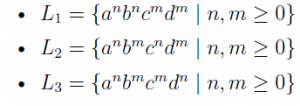CMI PHD 2022
Question 1 |
If Vinay finishes his homework and the school closes early, then he can play in the park or eat an ice cream. He will end up at the dispensary with tummy ache if he eats ice cream and plays in the park. Which of the following can be correctly inferred?,
If he doesn’t end up in the dispensary with tummy ache, then he did not finish
his homework or the school closed late. | |
If he doesn’t end up in the dispensary with tummy ache, he didn’t eat ice cream
and he didn’t play in the park. | |
Both (a) and (b) | |
None of the above. |
Question 1 Explanation:
(a) is not possible, because Vinay can finish his homework, the school can close early,
and he plays in the park without eating icecream. In this case he will not end up in
the dispensary, but neither of the conclusions in (a) can be inferred.
(b) is not possible, again because Vinay can play in the park without eating icecream,
or eat icecream without playing in the park. In both cases, he does not end up in the
dispensary. So one cannot infer the conjunction of the two conclusions in (b).
Hence the correct answer is (d).
Question 2 |
There are n members of Chennai Mathematical Institute. Most of them are very studious and like to own lots of books. Now the following facts have been learnt.
• No two members own exactly the same number of books.
• Each member owns strictly less than n books.
• No member has exactly 200 books.
Given the above information, which of the following is not a possible value of n?
• No two members own exactly the same number of books.
• Each member owns strictly less than n books.
• No member has exactly 200 books.
Given the above information, which of the following is not a possible value of n?
100 | |
199 | |
200 | |
201 |
Question 2 Explanation:

Question 3 |
Which of the following assertions about regular languages is incorrect?
Every subset of a regular language is regular. | |
For every regular language L, there is a subset of L that is regular.For every language L, there is a superset of L that is regular. | |
For every language L, there is a superset of L that is regular. | |
The complement of every regular language is regular. |
Question 3 Explanation:

Question 4 |
Consider the following languages over the alphabet {a, b, c, d}

Which of these languages is/are context-free?

Which of these languages is/are context-free?
None of them. | |
All of them. |
Question 4 Explanation:
There are 4 questions to complete.
